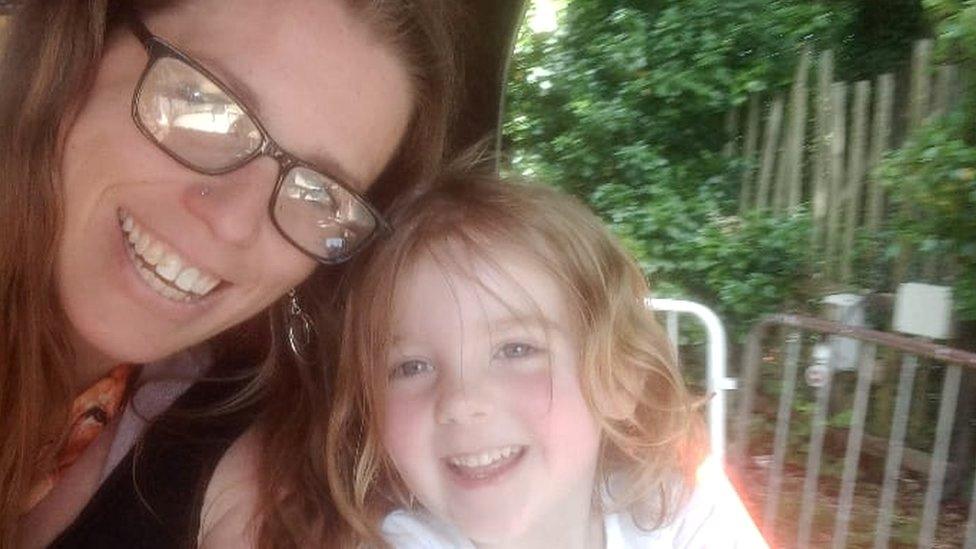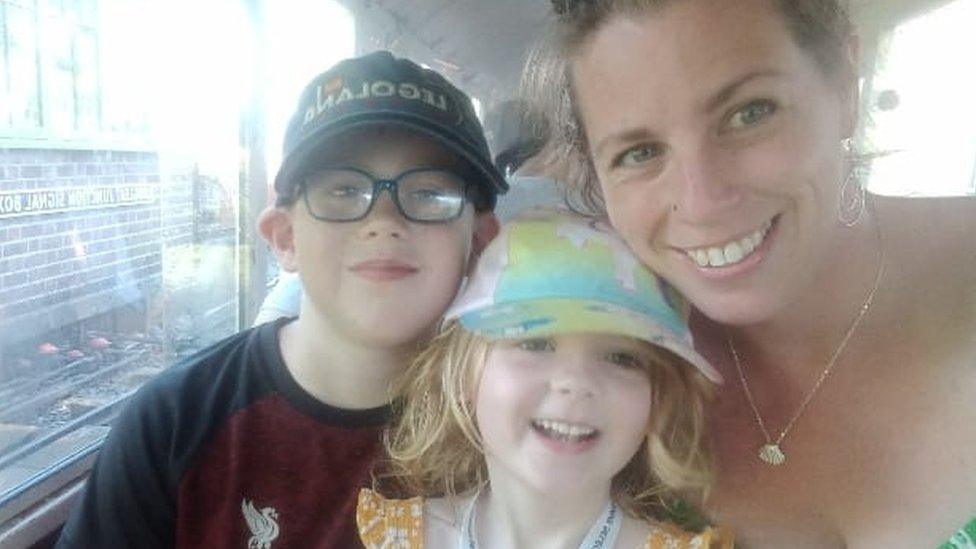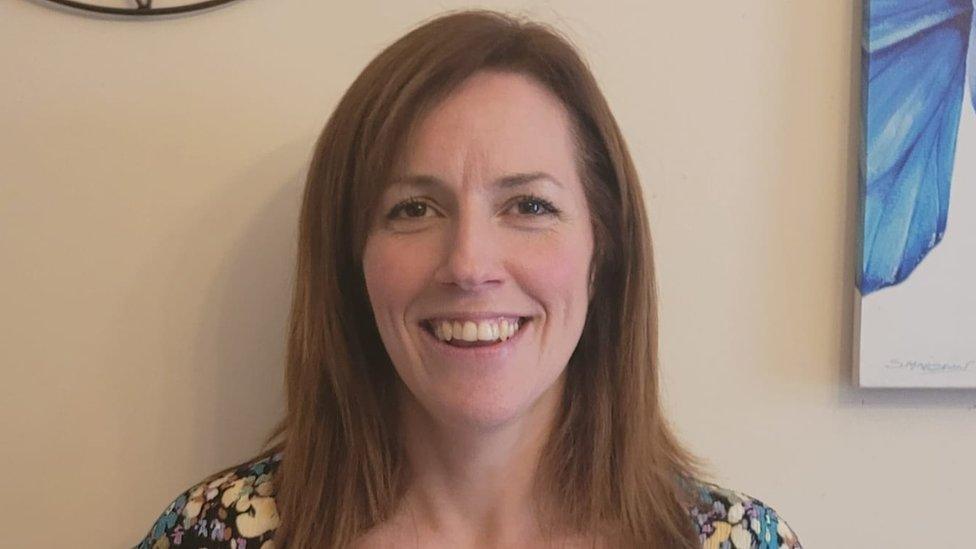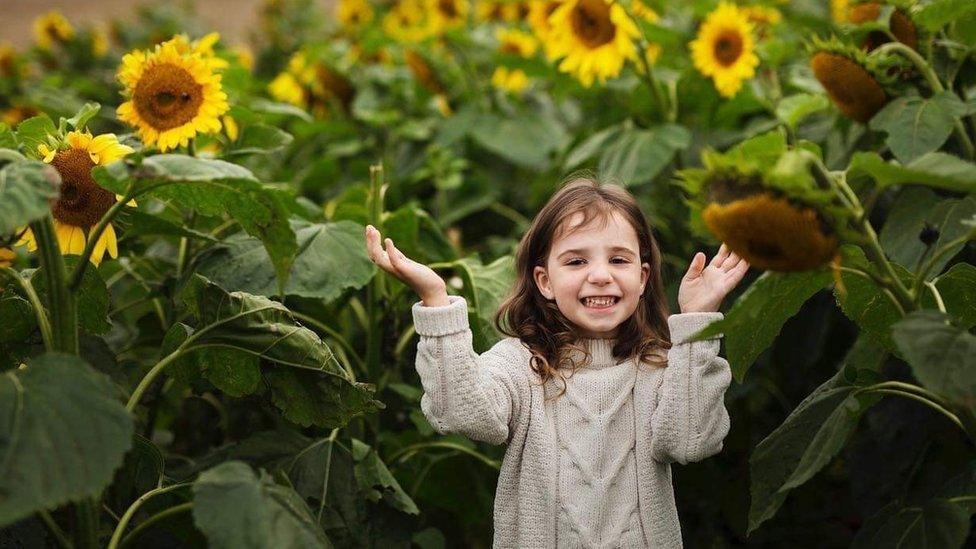Selective mutism families left 'isolated' due to lack of care
- Published

Joanna Turner felt unsupported after her daughter, Lucy, was diagnosed with selective mutism
A mum says families are being left "isolated" in areas which have "poor care" for children with selective mutism. Joanna Turner's four-year-old daughter was diagnosed with the anxiety-based mental health disorder last year, but discharged on diagnosis and left with no treatment plan. Mrs Turner said care varies across the country and this needs to change.
"Lucy wouldn't talk to anyone but me and her dad Chris.
"She wouldn't talk to her grandparents or nursery staff, anyone outside of us.
"She couldn't communicate her needs.
"We took her to the GP and were referred to a speech therapist who discharged us on diagnosis of selective mutism, external.
"There was a long assessment and a cognitive check which showed nothing wrong.
"I couldn't believe we were discharged with no plan of treatment."

Joanna Turner is petitioning for care improvements
Mrs Turner, 39, from Upton Scudamore, Wiltshire, said she was left with no option but to pay for private therapy, which has cost more than £2,500.
The mum-of-three has started a petition, which has almost 40,000 signatures, to equalise care across the country.
Different local health boards provide different care, because there was no standard care pathway, she said.
"Without treatment families can feel confused and isolated," she said.
"This needs to change. There needs to be an equal standardised pathway of care for all regardless of where you live.
"If we win we hope to see pathways and care invested in, and see support for those with this condition.
"Help for those who are isolated and unable to thrive due to selective mutism."
Bath and North East Somerset, Swindon and Wiltshire Integrated Care Board, which provides care in the area, said it provided support through a number of approaches, including via routine assessments.

Selective mutism
Selective mutism is a severe anxiety disorder where a person is unable to speak in certain social situations.
It affects about one in 140 young children and is more common in girls and children who are learning a second language.
It usually starts in early childhood, between age two and four, and, if left untreated, can persist into adulthood.
A child or adult with selective mutism does not refuse or choose not to speak at certain times, they're literally unable to speak.
The expectation to talk to certain people triggers a freeze response with feelings of panic, like a bad case of stage fright, and talking is impossible.
Source: NHS

Selective mutism is diagnosed according to strict guidelines, including a child being unable to speak to certain people for at least one month.
Mrs Turner said ideally she would like to see a professional liaising with family and school, ensuring key techniques were used and both parties worked together to support the child.
"Help would also be support for a child or adult with selective mutism to access the community, and to offer the child/adult counselling in the form of therapies, CBT therapy, counselling," she added.
Emma Manley, 47, from Wiltshire, also has a daughter with selective mutism and said Joanna's petition was "really needed".
It took her family, from Warminster, two years to get a diagnosis, which came in 2019.

Emma Manley is another mum who has struggled to find care for her daughter
"There was no help with treatment - really it's been nothing. No one approaches it," Mrs Manley said.
"It has been really difficult finding information, it's not known about at all. The awareness of how difficult it is needs to be raised.
Lindsay Whittington, co-ordinator at Selective Mutism Information and Research Association, said: "Those with selective mutism speak fluently in some situations but remain consistently silent in others.
"They may have a blank expression, or appear 'frozen' when expected to speak.
"Research has shown that with early intervention the prognosis for recovery is good but lack of this intervention may result in a child with selective mutism going on to have life-long problems and developing other disabling mental health problems."
The area's care board added: "We have a number of approaches in place around selective mutism which, while not part of a documented pathway, do provide support for those affected by the condition and their families."
Forums include the joint two-year assessments between health visitors and early years settings, and checks within schools which are part of a child's health provision.
Children who are identified with specialist concerns may then be referred for further assessment.
The board added: "Work is also under way to develop a position statement around selective mutism which will ensure there is consistent and clear information available for professionals, parents and carers to help them access guidance and support for the condition."
This will be shared via Local Offer websites for is areas, it added.

Follow BBC West on Facebook, external, Twitter, external and Instagram, external. Send your story ideas to: bristol@bbc.co.uk , external
- Published30 October 2020
